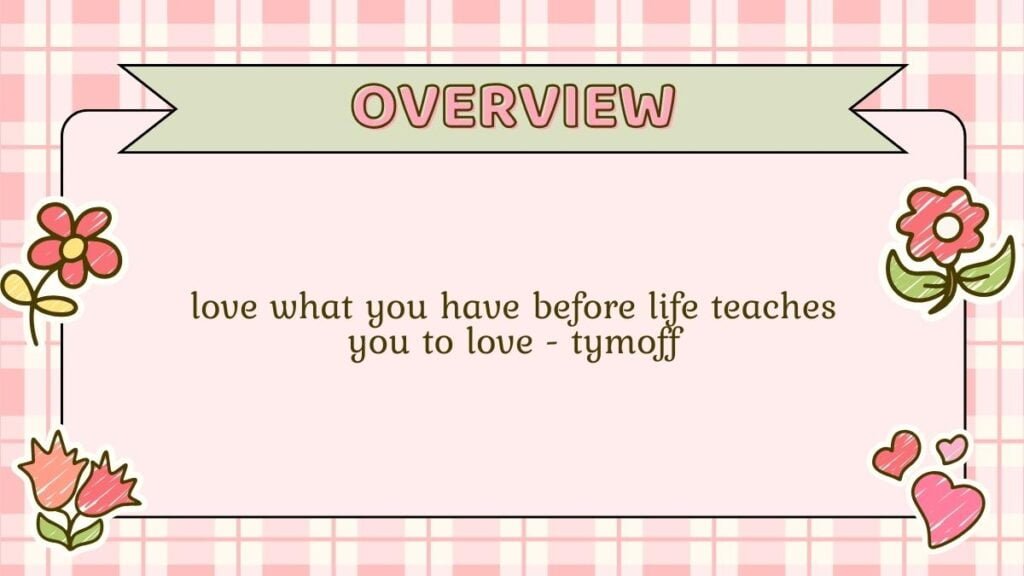With two trends of life characterized by the desire for more, the motto love what you have before life teaches you to love – tymoff interferes with timely wisdom to embrace life as it is. Founded on gratefulness and non-attachment to desire, this way of life enables individuals to value what they have, rather than constantly greedily pursuing more recognition or acquisition.
Origins of “love what you have before life teaches you to love – tymoff

It is a message that we should be thankful for what we have while we still can as it is a famous motto of the modern philosopher Tymoff who wants people to learn to practice gratitude and mindfulness in life. Though there is no documented evidence as to the genesis of Tymoff’s philosophy its virtue has served to inspire countless those in refuting or counteracting the rampant trend of consumerism and constant pursuit of something new that has invaded modern society.
Tymoff’s message is clear:
That is maybe why life loves to slap you with hardship for you to appreciate what you have. Instead of failing to pay attention to appreciation when faced with a crisis, he encourages readers to be proactively grateful for life today. This is just point-of-view presented by Tymoff which is a philosophical idea over love what you have because if it is considered in real life, it teaches a lot to love for what you’re having. The tymoff’s message has been made clear with the relevant philosophy.
Relevance in Today’s World
In a society driven by materialism and social comparison. In a society driven by materialism and social comparison, Tymoff’s philosophy holds significant relevance:
- Counteracting Materialism: Greed is a consistent theme of the text because people are never satisfied with the things they have and are constantly trying to amass more wealth. Although Tymoff becomes that which denies the importance of material things in life, he or she also points to the value of relationships, personal growth, and experiences.
- Mitigating Social Comparison: Through social media platforms people only get to see happy incidences of other individuals and hence make people envious and dissatisfied. Accepting the reality that we follow acknowledges that these filters make us accept wholesome reality with raw and coarse passion behind the crafted façade.
- Promoting Mental Well-being: It is argued that people change their mindset to let go of the misery of more by saying ‘No’ to materialism or practising gratefulness and mindfulness. It also provides an ability and context that makes one feel at ease and content with life in the present time.
- Strengthening Relationships: People’s acknowledgement and appreciation shape families and friendships, enhance stability and let them embrace vulnerable experiences. Tymoff keeps recommending people focus on people and not on things accumulated as these relations bring happiness.
Practices To love what you have before life teaches you to love – tymoff
To integrate “love what you have before life teaches you to love – tymoff, before life teaches to love” into daily life, consider the following practical steps:
1. Gratitude Journaling: Set an hour you can spend daily writing down things that you are thankful for. Thinking about positive experiences can help one paradigm shift from what they do not have.
2. Mindfulness Practices: Practice mindfulness meditation for this would help increase their awareness of the present time. By so doing, this practice draws focus to the simple joys of life and alleviates stress.
3. Cultivate Contentment: Learn to accept things: it is essential to set realistic goals in life to embrace what you have. Acknowledging that clarity and joy cannot be sourced from material objects leads to an appreciation for a more sustainable level of happiness.
4. Simplify Your Life: Be more mindful of our environment, literally and figuratively, and avoid spending time engaging in pursuing empty goals or filling our lives with meaningless objects. Having less causes less demand on any specific thing or event hence allowing a person to devote his or her attention to things that matter.
5. Nurture Relationships: Mainly to acknowledge and appreciate family/friends or to strengthen bonds with them. Building relationships can likely increase experiences and enhance the emotions that people have with other people.
Conclusion
Tymoff invited the people to change the culture to move from the concept of ‘love what you have before life teaches you to love – tymoff’ where they are busy looking for things they feel they lack rather than embracing what they have. Afforded by learned behaviors of gratitude, mindfulness, and contentment, man can enhance his joie de vivre and general well-being. As the world is governed by the ideas of ‘success’ and ‘popularity’ which often translates to a shower of gifts and recognition from friends, Tymoff helps enlighten people on wealth that is far greater than these worldly things that are seen and perceived.
FAQ‘s
Ans. Tymoff is a contemporary philosopher who has become famous for giving heartfelt messages such as gratitude and mindfulness. His teachings revolve around living appreciating your life, and the happiness that you already have and stopping seeking more.
Ans. People are willingly able to take a conscious step from rumination on what is missing to appreciation of what they have instead. And doing so clear links with several variables known to be associated with mental health.
Ans. The first practical step would be to jot down the things you are grateful for in a journal every day. I recommend learning how to self-regulate
Ans. Getting in touch with what is truly important in life. Tymoff helps to free people from the distractive influence of social expectations and pursue the most worthwhile values.
Ans. Yes, definitely by practicing thankfulness, being conscious of moments, and being satisfied with what they have, people can be happier throughout the day.
Also Read About
